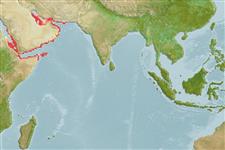Teleostei (teleosts) >
Eupercaria/misc (Various families in series Eupercaria) >
Lutjanidae (Snappers) > Lutjaninae
Etymology: Lutjanus: Malay, ikan lutjan, name of a fish.
More on author: Rüppell.
Environment: milieu / climate zone / depth range / distribution range
Ecology
Marine; reef-associated; depth range 10 - 20 m (Ref. 9710). Tropical; 29°N - 10°N, 38°E - 63°E (Ref. 55)
Indian Ocean: seas surrounding the Arabian Peninsula except the northern Red Sea and the Persian Gulf.
Size / Weight / Age
Maturity: Lm ? range ? - ? cm
Max length : 37.1 cm TL male/unsexed; (Ref. 11441); 44.2 cm TL (female); common length : 20.0 cm TL male/unsexed; (Ref. 55); max. published weight: 882.00 g (Ref. 128903); max. published weight: 882.00 g
Dorsal
spines
(total): 10;
Dorsal
soft rays
(total): 12-14;
Anal
spines: 3;
Anal
soft rays: 8 - 9. Snout somewhat pointed, dorsal profile of head moderately sloped. Preorbital bone slightly narrower than eye diameter. Preopercular notch and knob poorly developed. Scale rows on back rising obliquely above lateral line. Generally yellow, darker on back, grading to whitish ventrally with a series of seven or eight narrow, blue, longitudinal stripes on the sides, a large blackish spot on the lateral line below the anterior portion of the soft dorsal rays, and blue spots and broken lines on the head.
Adults inhabit clear coastal coral reefs. They occur singly or in small groups. Marketed mostly fresh.
Life cycle and mating behavior
Maturity | Reproduction | Spawning | Eggs | Fecundity | Larvae
Allen, G.R., 1985. FAO Species Catalogue. Vol. 6. Snappers of the world. An annotated and illustrated catalogue of lutjanid species known to date. FAO Fish. Synop. 125(6):208 p. Rome: FAO. (Ref. 55)
IUCN Red List Status (Ref. 130435)
Threat to humans
Harmless
Human uses
Fisheries: commercial
More information
Common namesSynonymsMetabolismPredatorsEcotoxicologyReproductionMaturitySpawningSpawning aggregationFecundityEggsEgg development
ReferencesAquacultureAquaculture profileStrainsGeneticsElectrophoresesHeritabilityDiseasesProcessingNutrientsMass conversion
Tools
Special reports
Download XML
Internet sources
Estimates based on models
Preferred temperature (Ref.
123201): 26.7 - 29.2, mean 28.1 °C (based on 232 cells).
Phylogenetic diversity index (Ref.
82804): PD
50 = 0.5000 [Uniqueness, from 0.5 = low to 2.0 = high].
Bayesian length-weight: a=0.01349 (0.01176 - 0.01547), b=2.97 (2.94 - 3.00), in cm total length, based on LWR estimates for this species (Ref.
93245).
Trophic level (Ref.
69278): 3.9 ±0.6 se; based on size and trophs of closest relatives
Resilience (Ref.
120179): Medium, minimum population doubling time 1.4 - 4.4 years (Preliminary K or Fecundity.).
Fishing Vulnerability (Ref.
59153): Low to moderate vulnerability (34 of 100).
